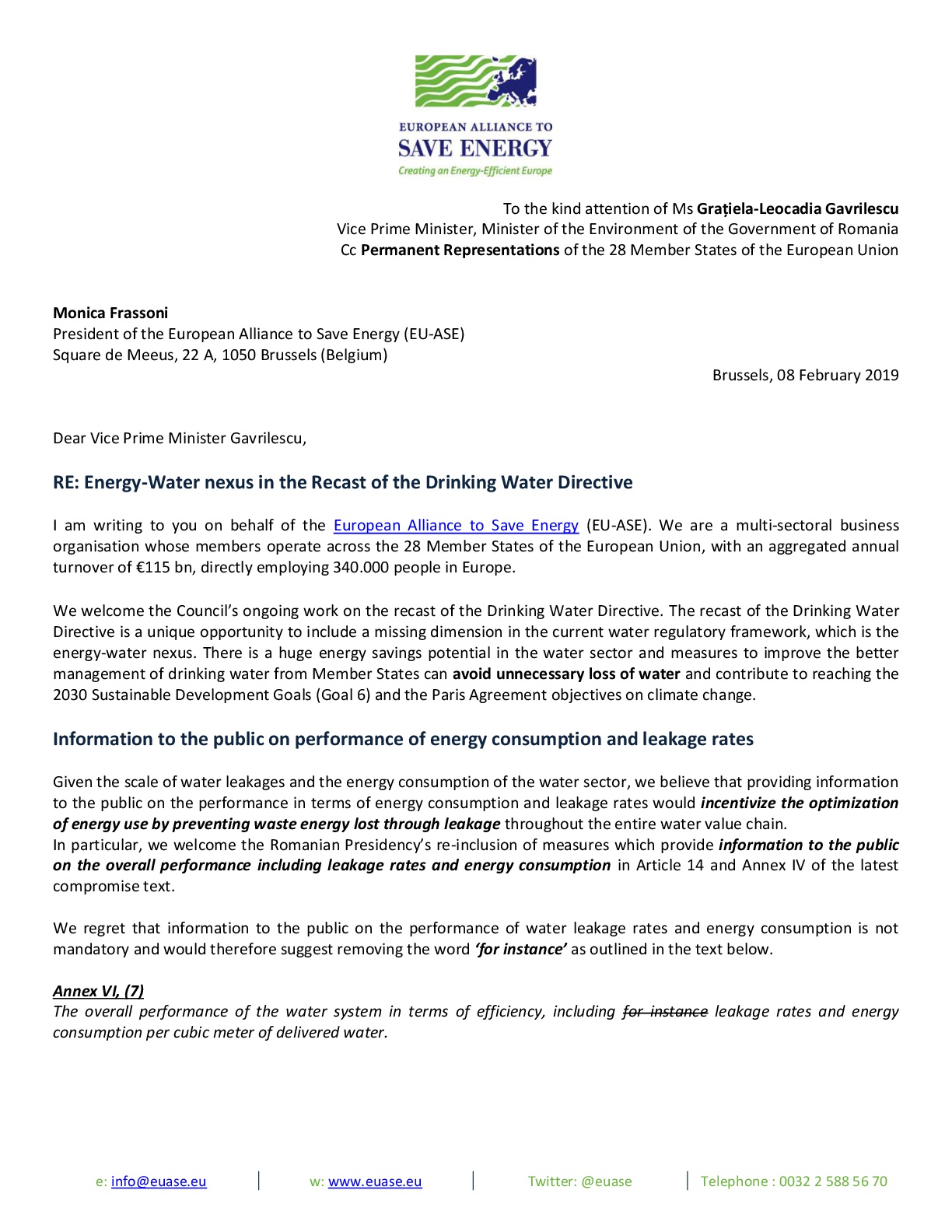
I am writing to you on behalf of the European Alliance to Save Energy (EU-ASE). We are a multi-sectoral business organisation whose members operate across the 28 Member States of the European Union, with an aggregated annual turnover of €115 bn, directly employing 340.000 people in Europe.
We welcome the Council’s ongoing work on the recast of the Drinking Water Directive. The recast of the Drinking Water Directive is a unique opportunity to include a missing dimension in the current water regulatory framework, which is the energy-water nexus. There is a huge energy savings potential in the water sector and measures to improve the better management of drinking water from Member States can avoid unnecessary loss of water and contribute to reaching the 2030 Sustainable Development Goals (Goal 6) and the Paris Agreement objectives on climate change.
Information to the public on performance of energy consumption and leakage rates
Given the scale of water leakages and the energy consumption of the water sector, we believe that providing information to the public on the performance in terms of energy consumption and leakage rates would incentivize the optimization of energy use by preventing waste energy lost through leakage throughout the entire water value chain.
In particular, we welcome the Romanian Presidency’s re-inclusion of measures which provide information to the public on the overall performance including leakage rates and energy consumption in Article 14 and Annex IV of the latest compromise text.
We regret that information to the public on the performance of water leakage rates and energy consumption is not mandatory and would therefore suggest removing the word ‘for instance’ as outlined in the text below.
Annex VI, (7)
The overall performance of the water system in terms of efficiency, including for instance leakage rates and energy consumption per cubic meter of delivered water.
Additional measures to tackle water leakage and address water scarcity
Current leakage rates at EU level are too high. According to the Commission’s impact assessment, 23% of treated water is lost in public water supplies in Member States. This means that 23% of the drinking water for the public must be treated again to enable access to clean drinking water for human consumption, adding to the high energy consuming profile of the drinking water sector.
As example, one leak of 8,3 mm has emission of 3454 kg CO2 eq/a or equivalent to 75% of a car running all year[1]. In Brussels, based on this calculation and on the assumption of real water losses of about 23%, water leakage produces a total volume of drinking water lost per year of 11,1 Million m3/a which determines 634,4 Mtoe/a CO2-emissions equivalent to the emissions of 138 cars running non-stop for the whole year.
In light of the above, we would like to underline that more ambitious measures are needed in order to effectively tackle the scale of Europe’s water leakage problem. We would recommend reinserting the Recital 21 – including mandatory Member State action plans to be developed in order to deal with the growing issue of water scarcity – and consider that investments are needed to incentivize Member States to upgrade their water infrastructure in order to better adapt to climate change and water stress. As such, for Recital 21, we suggest to consider the text outlined below.
Recital 21: The principles to be considered in the setting of water tariffs, namely recovery of costs for water services and polluter pays, are set out in Directive 2000/60/EC. However, the financial sustainability of the provision of water services is not always ensured, sometimes leading to under-investment in the maintenance of water infrastructure. With the improvement of monitoring techniques, leakage rates – mainly due to such under-investment – have become increasingly apparent and reduction of water losses should be encouraged at Union level to improve the efficiency of water infrastructure. In line with the principle of subsidiarity, that issue should be addressed by increasing transparency and consumer information on leakage rates and energy efficiency. Furthermore, Member States should be recommended to develop action plans that deal with the growing issue of water scarcity, including measures to deal with water leakage.
We trust you agree that reducing energy waste in the water sector makes economic and environmental sense as it delivers tangible, multiple and collective benefits to European citizens, households and local authorities.
We remain at your disposition for further discussion on this important topic.
Yours sincerely,
Monica Frassoni
[1] Energy for disinfecting by UV and distributing the water under 6,9 bars pressure in Brussels: 0,15 kW/m3 or 0,033 kg CO2 equivalent/m3. Considering 23% of water losses in Brussels, we waste 1,77 Giga Watts or 634,4 metric tons of CO2 eq per year, equivalent to 138 cars running non-stop on gas for the whole year (Source: Xylem Inc. based on International Energy Agency: World Energy Outlook 2016, Brussels Environment, Eurostat, US Environemental Protection Agency).
